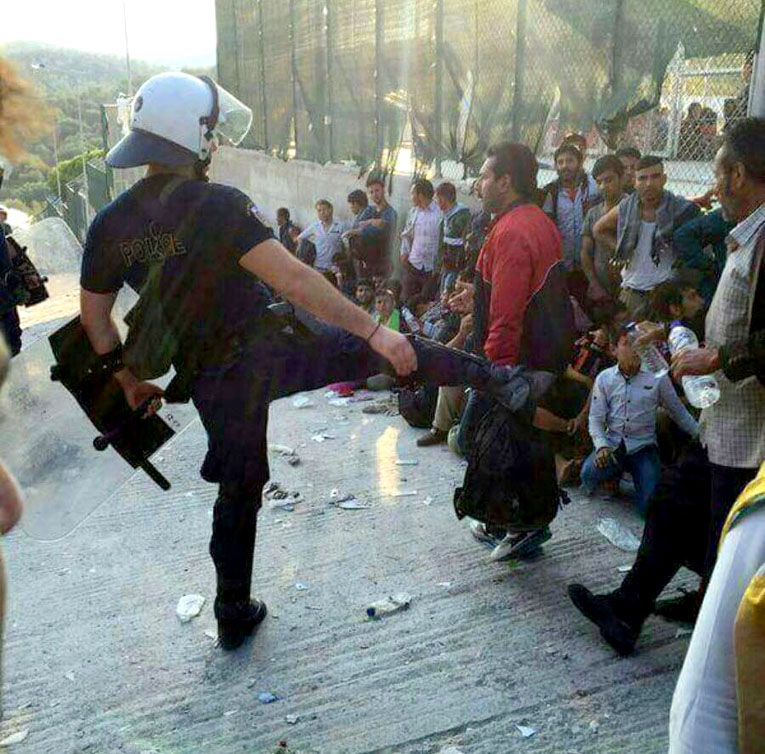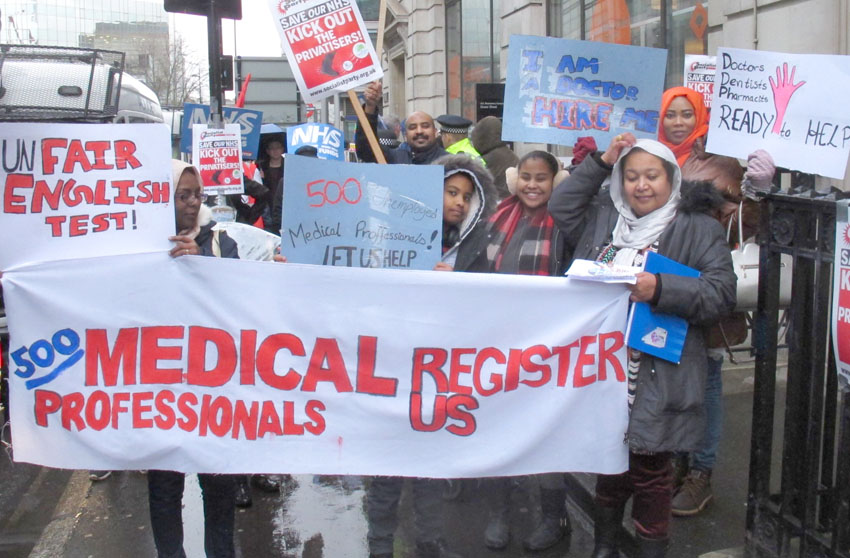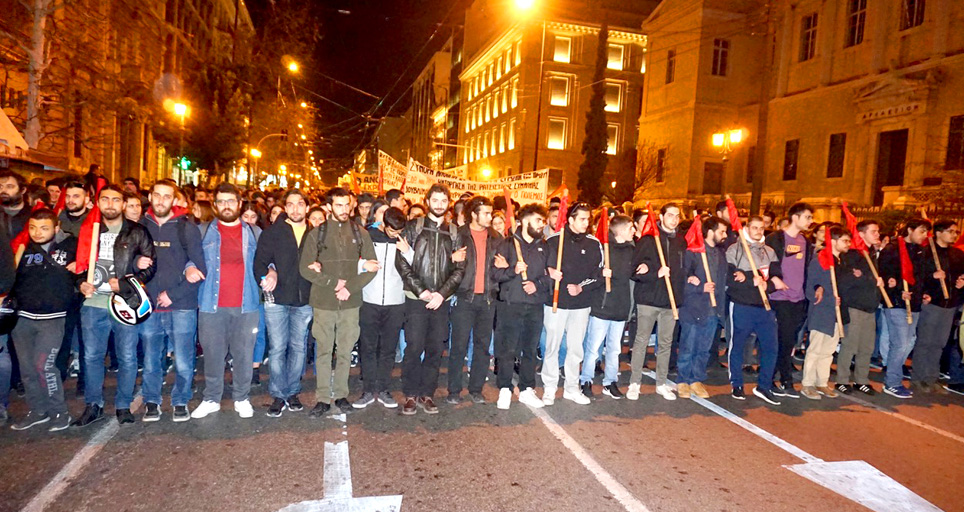Abysmal conditions for thousands of refugees in ‘Moria 2.0’ camp
THOUSANDS of people are living in abysmal conditions in a new camp, which was built to replace Moria camp on the Greek island of Lesbos, after it was destroyed by fire last month.
According to the Greek Council for Refugees and Oxfam, conditions are even worse than in Moria, with little or no running water, no sewage management or treatment, limited health facilities and woefully inadequate shelter.
Almost 8,000 people – most of them families with children – have been moved to the new camp, which has been dubbed ‘Moria 2.0’ by residents. Many are living in flimsy tents, some of which are pitched just 20 metres from the sea and have already been flooded and battered by strong winds.
The location of the new camp is on a former military shooting range, which had to be swept for landmines and unexploded grenades before being built on.
More than 12,000 people were left in destitution, following the fires that swept through Moria camp on the 8th and 9th September. Nearly 8,000 have been moved to a new emergency camp in the area of Kara Tepe where they are living in precarious conditions with no access to running water or protection from the weather.
People are having to live in flimsy tents pitched too close to the sea, meaning they are battered by wind and prone to flooding.
In addition, the inhabitants of the new camp have been given tents which are deemed ‘not fit for winter’.
Oxfam and the Greek Council for Refugees published a press statement on October 20 in which they declared that conditions in the migrant camp on Lesbos, set up after fire destroyed the original Moria camp, ‘are abysmal’ and worse than at the previous camp.
‘The new temporary camp on the Greek island of Lesbos is even worse than the original Moria camp, with inadequate shelter, hardly any running water, limited healthcare services, and no access to legal aid,’ read a joint press statement from the non-governmental organisation (NGO) Oxfam International and the Greek Council for Refugees.
The conditions the two organisations have reported in the new camp have solidified their conviction that all asylum seekers in Lesbos should be ‘immediately relocated to adequate accommodation on the Greek mainland and in other EU countries’.
Oxfam visited the camp at the end of September in order to conduct a ‘rapid protection assessment’, states their press release. Once there, they found ‘numerous risks’, including ‘limited access to food and healthcare, insufficient measures against Covid-19, as well as no drainage and sewerage system on site’.
Many of the tents lack solid foundations, reported the international charity. That means they afford little protection against weather extremes like strong sea winds and flooding.
In fact, since the team visited, it has received various photos from inhabitants of the camp whom they met during the reporting trip which testify to walkways and tents flooding or becoming sodden after just 10 minutes of rain according to the migrants who sent the photos.
Residents told Oxfam that the quantity of the food provided is ‘not enough’ as it is only handed out once or twice a day. It is also of ‘bad quality’, according to them.
Hygiene facilities are difficult at the new camp.
There is a lack of running water and so Oxfam says many of the camp residents have been washing in the sea. This poses the risk of drowning, particularly for children, notes Oxfam, as well as the risk of being infected by contamination from wastewater from the camp, which is also draining into the sea.
Women face particular problems, noted Oxfam, because there is a ‘lack of toilets and showers, as well as insufficient lighting in the new camp’.
This means they could be exposed to ‘increased risks of sexual and gender-based violence’.
Oxfam’s EU migration expert, Raphael Shilhav said in the press statement: ‘When Moria burnt down, we heard strong statements from EU decision-makers saying “No more Morias”. But the new camp is rightly dubbed “Moria 2.0”.’
Shilhav criticises both the EU and the Greek responses following the fire, calling them ‘pitiful’. He says instead of looking at relocation, the authorities have ‘opted for another dismal camp at the external borders, trapping people in a spiral of destitution and misery’.
Shilhav says that by leaving people at the edges of Europe they remain ‘in limbo and despair, out of sight of the European public and politicians’.
The Greek Council for Refugees (GCR) echoed Oxfam’s concerns. Natalia-Rafaella Kafkoutsou, a refugee law expert at the GCR, said the refugee body was also worried about the living conditions in the new camp.
Kafkoutsou welcomed the Greek government’s declaration to relocate all residents in the camp by Easter but said that plan ‘failed to address the squalid conditions in the camp, which will deteriorate in winter’.
Kafkoutsou said it was important that the Greek government offered coherent integration strategies and didn’t just ‘transfer a policy-made problem from the island to the mainland’. This means that the much-talked-about European solidarity mechanism needed to step up and work on an ‘effective relocation across member states for those seeking protection in Europe’.
Oxfam and GCR both expressed doubts about the ideas expressed in the new EU migration pact which was outlined towards the end of September. Kafkoutsou pointed out that ‘the practices and policies that led to the failure of the EU “hotspot” approach, both in Lesbos and the other Aegean islands, should not be replicated and consolidated in the EU’s future asylum system, which seems to be the case with the current proposals for a new EU migration pact.’
An asylum seeker currently living in Folkestone’s Napier Barracks assessment centre has spoken of the terrifying experience of crossing the English Channel.
This year, more than 5,000 refugees have made the arduous journey here on small boats and dinghies – risking their lives to do so.
They are often overloaded with people and many have had to be rescued from trouble by Border Force patrols or citizen boats.
The refugee, who has asked to be identified as MS, told the story of his harrowing experience.
After fleeing his home country of Yemen, MS spent several years homeless on the streets of Spain and Belgium.
However, nothing could have prepared him for how hard the journey would be. He said: ‘It was a really scary trip. We set off at three in the morning, and it lasted for nearly four hours. The engine stopped three times.
‘The waves hit us several times and nearly capsized us on one occasion.’
As many of the small boats are overloaded, refugees making the crossing need to be constantly alert to stop the craft from sinking.
As most attempts occur under cover of darkness, it can be difficult to keep afloat, as MS explains: ‘The water enters the small boat a lot.
‘We were working throughout the trip to take out the water so that we would not drown. We were very wet, and freezing cold because it was early in the morning.’
The majority of refugees who have made the crossing are young men. MS says on his boat there were several women and children, some of whom became panicked by the ordeal.
He said: ‘There was a little Syrian boy who had a panic attack. He started screaming hysterically whenever he saw the water coming in and he said, “I cannot swim.”
‘We tried to calm him down and reassure him that we will arrive safely.
‘A Yemeni woman who was on the trip was very frightened and prayed all the time and sometimes cried.’
According to him, it was at the point when a Border Forces boat arrived that the refugees finally felt like they were safe.
MS explained: ‘We didn’t feel safe until we saw the Border Forces boat that pulled us onto their ship and gave us some blankets so that we wouldn’t get cold.
‘That renewed our hope that we might have a better chance in the UK than we had in Europe.’
Unaccompanied children who have crossed the Channel in small boats are being forced to wait for days in a holding unit without access to beds or showers before being placed in local authority care, a government watchdog has warned.
The children’s commissioner, Anne Longfield, said delays in moving youngsters out of the Kent Intake Unit – where asylum seekers who have crossed the Channel from France are processed before being moved on to other areas – was creating an ‘untenable’ situation.
Unaccompanied minors arriving on the UK coast previously went straight into local authority care in Kent, but Kent County Council announced in August that it had reached capacity and could not take in any more children.
The Home Office said the underage arrivals would instead be kept at the Kent Intake Unit before being placed with social services. The department is said to have recruited a team of four agency staff to work at the unit, which is located within the port of Dover and has a short-term holding facility for both adults and children.
Anne Longfield warned that the current system was leaving ‘children who had survived a dangerous boat crossing, and may have slept rough for months or been trafficked, waiting almost 72 hours in a holding unit without access to showers or beds, waiting for social workers from another county to come and collect them’.
In a blog post following a recent visit to the Kent Intake Unit, the commissioner wrote: ‘While front-line staff are working tirelessly to care for these children, the current situation is untenable.’
The Home Office said children would be allocated to local authorities across the country under the national transfer scheme, a voluntary programme set up in 2016 to more evenly share the costs of supporting unaccompanied children.
However, Longfield said the system and processes for dispersing child asylum seekers to local councils nationally was ‘buckling’ and in need of reform.
‘It is crucial that the scheme is reformed and properly funded so that more councils are willing to take children into their care, especially when cash-strapped councils are already struggling to provide the right support for the children already in their care. A national age assessment scheme could also help to reduce delays,’ she said.
Around 100 local authorities have pledged more than 400 places for unaccompanied children under the scheme, but the Home Office has said more needs to come forward and ‘do their bit for vulnerable children’.
Bridget Chapman, learning and project coordinator for Kent Refugee Action Network (Kran), which supports asylum-seeking children and young people in the Kent area, said: ‘I’m horrified but not surprised to find that children are being kept in what amounts to dehumanising conditions.
‘We raised questions about the suitability of this venue being used to hold them and nothing was done. We now have vulnerable children being traumatised in Kent before they’re then moved on to somewhere else.’
Chapman called for the national transfer scheme to be reinstated and funded ‘properly’, adding: ‘It has to be done with a support plan in place. It has to be funded properly and it has to be done in a timely fashion.’
Bella Sankey, director at Detention Action, said: ‘A government can be judged on how it chooses to treat unaccompanied refugee children that seek its help. Ours is currently detaining these children indefinitely, with adults, in cramped conditions and without basic facilities such as beds.
‘It is a sickening situation and a deliberate policy choice of Priti Patel’s Home Office which has failed to ensure that local authorities around the country are resourced and mandated to promptly take these children into their care.’


